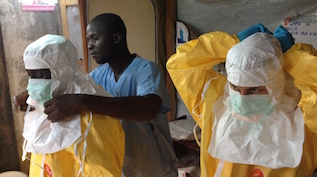Should Donors Still Be Considering a Contribution to Help with the Ebola Crisis?

It’s easy to see, in recent weeks, the decline in media attention to Ebola, but the reality is that the Ebola virus outbreak is far from being a closed case.
Since the outbreak gained steam, there have been more than 13,000 cases and nearly 5,000 deaths. Some reports have indicated that the number of new cases are declining, but that is a precarious claim at best. The most recent report from the World Health Organization noted that cases in Sierra Leone were continuing to grow, and while cases in Liberia appeared to be falling off the upwards track they had been on, there was still “persistent and widespread” virus transmission.
A significant push within the last few months has provided funds to address some of the most immediate needs for supplies and facilities. However, much remains to be done. Fragile healthcare and economic systems have been shredded, schools have been closed, setting children in affected areas back by nearly a year, and the social systems to handle the growing number of orphans do not exist. These systems – health, economy (livelihoods and agriculture), education, and social, are the needs that will remain long after the last case of Ebola is gone.

Our team at the Center for Disaster Philanthropy has been wildly impressed with the generosity of the Gates Foundation, the Paul G. Allen Foundation, and the work of Mark Zuckerberg and his wife Priscilla Chang. Despite this generosity, the needs in Sierra Leone, Liberia, Ghana, and other West African nations are mounting. With the largess of Google and others coupled with the magnitude of need, it may seem daunting to know just where a family or community foundation can fit in. Without a shred of doubt, there is a role for community foundations and family philanthropy in stemming the tide of the Ebola pandemic.
So, where can a family foundation fit in? Here are a few tips:
Stay consistent with your grantmaking. Continue to support the organization with whom you have trusted relationships.
CARE, Save the Children, the International Medical Corps, the International Rescue Committee and others have a long standing presence in West Africa and are integral parts of the solution to the crisis. Each one of the organizations we have listed above would welcome an additional contribution for their Ebola-related work, and there are others on the ground as well.
Support systems. The health, social, educational, economic, and agricultural systems of Ebola-effected countries are in grave danger.
The health, social, educational, economic, and agricultural systems of Ebola-effected countries are in grave danger. Schools are closed, children are orphaned, crops are not getting planted when they need to be, businesses are closing, and an already weak health system is being taxed in unprecedented ways. Making a gift to an organization that supports efforts to bolster or strengthen these systems will have a lasting impact for years to come.
Collaborate. Work with like-minded foundations to both support the needs of organizations responding to this crisis AND consider devising strategies to educate and inform all members of the family, all stakeholders to the foundation, and all people and organizations touched by your foundation’s work.
Spread the word about this pandemic and share the myriad of ways that private philanthropy can make a difference. The world health systems affected by this pandemic ultimately affect all of us, and regrettably this will not be the last health pandemic crisis we face. Building collaborative networks of funders is both an act of good stewardship and generosity toward those directly impacted by the crisis and, it is an act of preparedness against future crises. For only the third time in the Center for Disaster Philanthropy’s history, we have launched the Ebola Action Fund to support this crisis.
As you meet to consider your end of year giving, please consider a contribution to stem the Ebola pandemic . While the number of cases may hold steady or taper off, there remain 15,000 individuals who are no longer here to serve as mothers, fathers, teachers, farmers, nurses, midwives to provide critical functions in fragile communities in countries in West Africa.
Please do not hesitate to reach out to us with any questions at regine.webster@disasterphilanthropy.org or anna.hurt@disasterphilanthropy.org.
